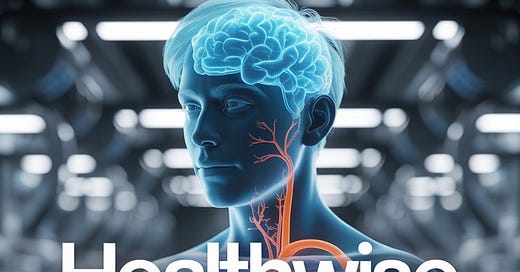Ever look in the mirror and think, "Wait, who's that distinguished, slightly-more-tired-looking individual?"
We all know aging is a fact of life. The candles on the cake multiply, the back makes a few more sound effects when you stand up, and finding a grey hair feels like a betrayal from your own scalp.
But here’s a little secret from my corner of the science world: chronological age is just a number. Biological age is where the real action is. As a biochemist, I’ve spent countless hours marveling at the beautifully complex molecular dance happening inside our cells. I've also seen what happens when the music stops and someone starts spilling the cellular punch.
The good news? You have way more control over your biological age than you think. It often comes down to ditching a few common habits that are quietly pressing the fast-forward button on your cells. So, let's put on our imaginary lab coats and dive into the five cellular crimes you might be committing—and how to become a master of anti-aging espionage.
1. The Culprit: The Chair-pocalypse (aka, Excessive Sitting)
We live in a world designed for sitting. We sit to work, sit to eat, sit to drive, and then sit to binge-watch shows about people who are definitely not sitting. It seems harmless, but on a cellular level, your body is staging a quiet protest.
The Cellular Crime Scene: Your cells contain tiny power plants called mitochondria. Their job is to convert food and oxygen into ATP, the energy currency of your body.
When you’re sedentary, you’re basically telling your mitochondria, "Hey, take the day off." They become lazy and less efficient. Fewer, weaker mitochondria mean less cellular energy, more oxidative stress (think of it as cellular "rust"), and a slowdown in repair processes. Even worse, studies suggest chronic sitting can shorten your telomeres—the protective caps on the ends of your DNA. Shorter telomeres are a classic hallmark of cellular aging. Yikes.
The Anti-Aging Antidote: Movement Snacks
You don’t need to run a marathon tomorrow. Just break up the sitting.
The 50/10 Rule: For every 50 minutes of sitting, get up and move for 10. Walk around, do some stretches, have a 10-minute dance party.
Take Calls on the Move: Pace around your room or office while you’re on the phone.
The Inefficient Human: Park a little farther away. Take the stairs. Carry your groceries instead of using a cart for three items. Make movement a natural part of your day, not just a one-hour event at the gym.
2. The Culprit: The Cellular Desert (aka, Chronic Dehydration)
"Drink more water" is advice so common it's almost boring. But let's be honest, how many of us are running on a thimbleful of water and a gallon of coffee? Dehydration isn't just about feeling thirsty; it’s about putting your cells into a state of panic.
The Cellular Crime Scene: Your cells are essentially tiny, sophisticated water balloons. Every single biochemical reaction, from generating energy to repairing DNA, happens in a water-based medium.
When you're dehydrated, your cells literally shrink. This concentrates waste products inside them and makes it harder for enzymes (the little protein machines that do all the work) to function. Imagine trying to run a factory with sludge instead of water in the pipes. Nothing works right. Your skin cells lose their plumpness (hello, fine lines!), and your brain cells struggle to communicate effectively (hello, brain fog!).
The Anti-Aging Antidote: Strategic Hydration
Start Strong: Begin your day with a big glass of water before your coffee. You’ve just gone 8 hours without a drink; your cells are parched.
Carry a Bottle: It's a simple visual cue. If you see it, you'll sip it.
Eat Your Water: Foods like cucumber, watermelon, celery, and strawberries are packed with water and electrolytes, which help your cells actually absorb the H2O.
3. The Culprit: The Lonely Cell Syndrome (aka, Social Isolation)
Humans are wired for connection. We may be introverts or extroverts, but we are not meant to be islands. Prolonged loneliness can be as detrimental to your health as smoking 15 cigarettes a day, and the damage starts deep inside.
The Cellular Crime Scene: When you feel chronically lonely, your body perceives it as a threat. This triggers a sustained "fight-or-flight" response, flooding your system with the stress hormone cortisol.
This isn't the only problem. Loneliness also ramps up inflammation by activating genes that produce inflammatory molecules called cytokines. A little inflammation is good—it helps you fight off a cold. Chronic, low-grade inflammation, however, is a cellular arsonist, damaging tissues and accelerating aging in the brain, heart, and joints. Conversely, positive social interaction releases oxytocin, a wonderful hormone that lowers cortisol and has anti-inflammatory, antioxidant effects. It’s a literal anti-aging molecule!
The Anti-Aging Antidote: Scheduled Socializing
The 5-Minute Call: You don't need a three-hour dinner party. Call a friend while you're doing the dishes. Send a meaningful text.
Join a Tribe: Find a book club, a walking group, a volunteer organization, or a weekly trivia team. Shared interests are a powerful glue.
Quality over Quantity: Focus on nurturing a few deep, meaningful connections. One good conversation can produce more oxytocin than a dozen superficial interactions.
4. The Culprit: The Cortisol Cascade (aka, Chronic Stress)
Notice a theme here? Cortisol is back, and this time, it’s personal.
A little bit of stress is a motivator. It helps you nail that presentation or swerve to avoid a squirrel. Chronic, unrelenting stress, however, is like leaving the emergency alarm blaring 24/7.
The Cellular Crime Scene: Cortisol is a catabolic hormone, which means it breaks things down. It tells your body to break down muscle tissue for energy and, tragically, to break down collagen, the protein that keeps your skin firm and your joints supple.
But its most sinister act is against those telomeres we mentioned earlier. Stress inhibits the activity of an enzyme called telomerase, whose job is to repair and lengthen your telomeres. So, not only does stress shorten your telomeres, but it also sabotages the repair crew.
It's a double-whammy of cellular aging.






